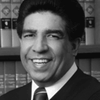Daniel Epstein (Illinois)
Daniel Epstein (Democratic Party) ran for election for the 1st District judge of the Illinois Supreme Court. He lost in the Democratic primary on March 17, 2020.
Epstein completed Ballotpedia's Candidate Connection survey in 2020. Click here to read the survey answers.
Biography
Daniel Epstein earned a bachelor's degree from Washington University, St. Louis, in 2007 and a J.D. from the University of Chicago Law School in 2015. His career experience includes working as an attorney with Chicago-based law firm Jenner & Block and being the co-founder of the online services company ZEYO.[1]
Elections
2020
See also: Illinois Supreme Court elections, 2020
General election
General election for Illinois Supreme Court 1st District
Incumbent P. Scott Neville defeated Richard Mayers in the general election for Illinois Supreme Court 1st District on November 3, 2020.
Candidate | % | Votes | ||
| ✔ |  | P. Scott Neville (D) | 100.0 | 1,765,329 |
| Richard Mayers (Independent) (Write-in) | 0.0 | 31 | ||
| Total votes: 1,765,360 | ||||
 = candidate completed the Ballotpedia Candidate Connection survey. = candidate completed the Ballotpedia Candidate Connection survey. | ||||
| If you are a candidate and would like to tell readers and voters more about why they should vote for you, complete the Ballotpedia Candidate Connection Survey. | ||||
Do you want a spreadsheet of this type of data? Contact our sales team. | ||||
Democratic primary election
Democratic primary for Illinois Supreme Court 1st District
The following candidates ran in the Democratic primary for Illinois Supreme Court 1st District on March 17, 2020.
Candidate | % | Votes | ||
| ✔ |  | P. Scott Neville | 26.2 | 214,066 |
 | Jesse G. Reyes | 20.3 | 165,344 | |
 | Sheldon Harris | 15.1 | 123,166 | |
 | Cynthia Cobbs  | 12.7 | 103,497 | |
 | Margaret Stanton McBride | 12.4 | 101,475 | |
 | Daniel Epstein  | 8.2 | 66,762 | |
 | Nathaniel R. Howse | 5.1 | 41,205 | |
| Other/Write-in votes | 0.0 | 22 | ||
| Total votes: 815,537 | ||||
 = candidate completed the Ballotpedia Candidate Connection survey. = candidate completed the Ballotpedia Candidate Connection survey. | ||||
| If you are a candidate and would like to tell readers and voters more about why they should vote for you, complete the Ballotpedia Candidate Connection Survey. | ||||
Do you want a spreadsheet of this type of data? Contact our sales team. | ||||
Withdrawn or disqualified candidates
- Clint Krislov (D)
Campaign themes
2020
Video for Ballotpedia
| Video submitted to Ballotpedia Released June 24, 2019 |
Ballotpedia survey responses
See also: Ballotpedia's Candidate Connection
Daniel Epstein completed Ballotpedia's Candidate Connection survey in 2020. The survey questions appear in bold and are followed by Epstein's responses.
| Collapse all
I have worked for progressive causes for the last 15 years. I fought white supremacists while working in the British House of Commons, testified in DC in support of marriage equality, and worked across the country to expand access to early childhood education. I founded a nonprofit providing citizen-owned security cameras and solar panels to families in Chicago's Austin neighborhood, and serve on the board of the Jewish Council on Urban Affairs and Lawndale Christian Legal Center's Young Professionals Council.
I represented Illinoisans who were hurt by the state's justice system and my campaign proposes reforms to court rules that other states have already adopted, and that would prevent wrongful convictions and judicial corruption.- End cash bail.
- Stop compensating courts for convictions.
- Create an independent body to determine judicial conflicts of interest and recusals, so that we no longer rely on the honor system to stop judges from deciding cases for campaign donors.
Our courts are entitled to extra funds if they convict, granting financial rewards for finding guilt rather than truth.
They jail for years people who have been deemed safe to return to the community not because they have been found guilty, but because they do not have the cash to afford their bail.
They allow quacks to qualify as "expert witnesses" and submit pseudoscientific testimony that has been used to wrongfully convict people.
They lack tools to defend against racist and sexist jury exclusion and biased sentencing.
They fail to provide the type of discovery in criminal cases that would help expose decades-long serial police misconduct and faulty forensics.
They rely on the honor system to stop judges from deciding cases for campaign donors.
Those policy making powers are critical, because they can be used to prevent recurring injustices. Illinois Supreme Court justices have the power to prevent judicial corruption by reforming recusal policy, to prevent wrongful convictions based on junk forensic science by reforming our expert admission standard, and to prevent serial police misconduct by reforming the rules of criminal discovery. They have that power, and in many instances it is exclusive. The legislature cannot make many of these necessary reforms-they have tried and were rebuffed for breaching separation of powers. Only the seven justices have the power to reform voir dire to prevent racist jury selection, or sentencing policy to require judges to explain on the record the reasoning behind their sentences (which would allow defendants to effectively appeal erroneous sentences).
One of the most interesting illustrations of this is in a 1982 case called People v. Davis. Prior to the case, the Illinois legislature passed a law requiring judges to explain on the record how they arrive at the sentences they issue (that is important, because judges sometimes make errors in sentencing and if they do not explain their reasoning on the record, it becomes effectively impossible to fix via appeal). Not long after that law passed, some judges did not explain the reasoning behind their sentences and defendants petitioned for remand, arguing that the judges' failure to provide statements of reasons violated that statute. The Illinois Supreme Court concluded that "the pronouncement of sentence is at the heart of the judicial function," and so the legislature's statute cannot be interpreted to require judges to explain their sentences on the record. In other words, the Illinois Supreme Court said, "you cannot fix this, only we can fix this." And then they did not fix it. So it is still this way.
There are exceptionally talented and experienced people who would make great judges, but who chose a different career trajectory because they knew they would be shamed as "not qualified" even though they were. And by the time they passed the 10 year mark, they were partners at major firms and a job change no longer made sense for them. So not only does the bar association's rule reduce age diversity, it pushes away talent.
Note: Ballotpedia reserves the right to edit Candidate Connection survey responses. Any edits made by Ballotpedia will be clearly marked with [brackets] for the public. If the candidate disagrees with an edit, he or she may request the full removal of the survey response from Ballotpedia.org. Ballotpedia does not edit or correct typographical errors unless the candidate's campaign requests it.
See also
2020 Elections
External links
Footnotes
- ↑ Information submitted to Ballotpedia through the Candidate Connection survey on February 22, 2020
| ||||||||||









